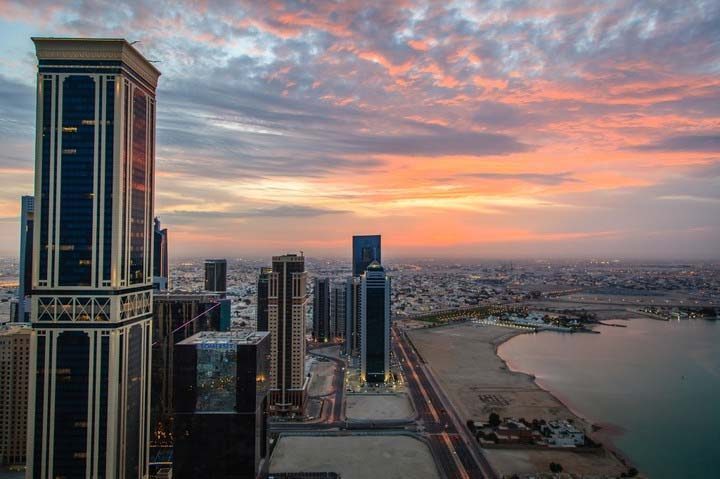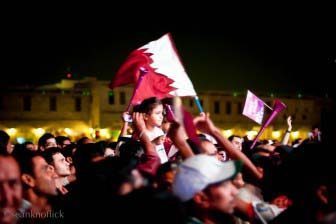
Qatar has found itself under immense media scrutiny since it won the right to host the 2022 World Cup. Much of that coverage has been critical and, some argue, harsher than that leveled at other countries hosting World Cups or Olympics.
In this guest post originally published by Al-Fanar, Justin D. Martin, an assistant professor of journalism at Northwestern University in Qatar, takes a closer look at how international journalists have covered the Gulf state in recent years.
Qataris are “as bent as an Arab’s dagger,” a BBC radio guest said in a discussion of the 2022 World Cup in November.
The BBC host didn’t challenge the racist comment. When my turn came to speak, I denounced the statement, though I was soon interrupted – the BBC host didn’t want to address the slur and said only that the man’s microphone had been cut off.
Such a scabrous comment about both Arabs and Qataris on a major news broadcast is rare, but it plays to the belief many Qataris have about news coverage of both their nationality and Arabs in general.

Among vocal Qataris who follow global news, a common belief is that Qatar is unfairly targeted by Western journalists, who feel the World Cup should be in one of their countries. Some Qataris even feel such coverage is driven by racism.
Outside Qatar, typical criticisms are that the country has little to no soccer tradition, is unfit to host the World Cup given its small size and extreme weather, treats migrant workers abysmally, resists gender equality, and won World Cup hosting rights with graft.
Both sides are partly right.
Disproportionate scrutiny
It seems unprecedented that a country set to host a World Cup in 7.5 years is getting the amount of coverage it is.

Russia, which is also hosting two Olympics this decade, violates the rights of more people than Qatar, though Russia was not as big a target for negative coverage in 2011 for its 2018 World Cup as Qatar is now.
Nor did Brazil endure Qatar-proportionate scrutiny seven years before its World Cup. There are many more editorials and op-eds on why Qatar should not host the World Cup than why Russia shouldn’t, even though Putin’s chalice is in just three years.
Every country that hosts the Olympics or World Cup must brace for negative attention. If the 2022 World Cup stays in Qatar, Qataris will see sustained coverage of abuse of laborers, a jailed poet, arrests of foreign journalists, laws criminalizing being gay or unwed and pregnant, and more.
But the very coverage of the first Arab World Cup is also fair game for scrutiny.
One of my Qatari undergraduates, Alanood Al-Thani, who is distantly related to the country’s ruling family and has been publicly vocal on Qatar’s human-rights lapses, makes a good point:
“When you see all of these news articles that are coming out, I agree with most of them, but…there is not one single Qatari perspective,” she told Public Radio International in June.
Stories from outlets like Huffington Post, Daily Beast, and AFP, to name a few, do not include quotes from a single Qatari, only official statements from the occasional Qatari institution.
Many Western journalists writing about Qatar have never visited the country, do not know a single Qatari, and repurpose stories on Qatar from other news outlets while at their desks in New York, D.C., or London.
And yet, Qatari media observers may look back on 2010 to 2015 as a honeymoon period for media coverage.
US coverage
In a six-nation survey of media behaviors and attitudes in the Arab world released in April by Northwestern University in Qatar, just 7 percent of Qataris said international news organizations are biased against their country.
Far more, 19 percent, said global news media are biased in favor of Qatar, and most Qataris said coverage is fair. This could mean, as of April, Qatari nationals were largely inattentive to negative, international coverage of their country. It could also mean Qataris do pay attention to negative coverage but think it’s fair or even a helpful influence.

Such attitudes may change. Since Qatar was awarded FIFA hosting rights in 2010, and until the recent extradition of FIFA officials from Switzerland to the U.S. on charges of bribery and corruption, much coverage of Qatar in U.S. news organizations focused on Qatar business deals, diplomatic summits, or the expansion of Qatar Airways.
Now, though, U.S. news outlets seem to be nearing British media in the intensity (and snark) of Qatar-suspicious coverage. The kind of story that was on PBS on June 17 – “Migrant laborers worked to death as Qatar builds for World Cup” – was more likely to be seen two years ago in British outlets, as was this viral Washington Post graphic on Qatar World Cup worker deaths. (The graphic was erroneous, but instead of retracting the story The Post performed a tortuous revision and correction).
Qatar is not so popular in parts of the Arab world. It has been criticized for meddling in the affairs of Egypt, Libya, Syria, and elsewhere. It is also viewed as opposing uprisings close to home, as in Bahrain.
In 2010, Qatar won rights to host the World Cup just two weeks before a Tunisian fruit vendor immolated himself and, riding high from the FIFA victory, thrust itself into the conflicts in Tunisia, Egypt, and Libya, where at least two of those uprisings gave way to sustained chaos.
“Uniquely among regional states, Qatari officials saw the outbreak of unrest in Tunisia, Egypt and Libya…as an opportunity to be seized, rather than a challenge to be contained,” wrote Kristian Coates Ulrichsen, a fellow at Rice University’s Baker Institute, in his book, Qatar and the Arab Spring.
This, along with a general bias against nouveau riche, likely means Qatar will face ongoing criticism not just from Western media, but also Arab journalists. Arab criticism will likely come despite that Qatar-sympathetic news coverage about the World Cup is pledged by some of the emirate’s Arab Gulf partners.

Either way, with U.S. media enthralled by recent FIFA arrests, critical coverage of Qatar will likely continue to rise, and the number of Qataris who feel global coverage of their state is negative may increase.
The work of both Qatar supporters and critical commentators seems influenced by race or the belief that others are racist; journalists are waging more, and earlier, criticism against Qatar than they level at non-Arab states hosting major sporting events.
Qatar supporters claim racist bias is a primary reason news media are highlighting the country’s real problems. Many journalists now covering Qatar’s human-rights problems are sports writers and soccer fans who have little to no history of reporting on social issues. It’s great that they now wish to write about things that matter, but the specific shift does arouse suspicion.
I wrote in The New Republic in 2014 that Qatar should keep the Cup because, unlike some other countries that host international sporting events, like the UAE, Russia, and China, Qatar responds to coverage of its human-rights record with occasional reform.

If the 2022 Cup is relocated, it is likely coverage of human rights issues in Qatar will recede, as may would-be improvements.
Another article, also in The New Republic, by one law and one economics professor from the University of Chicago, argued Qatar does more per capita to combat global income inequality than any wealthy country, as well over half the country’s population consists of migrant workers from poor countries.
A relocated World Cup would not help Qatar’s roughly 1.4 million migrant workers, which is what many journalists and human rights activists say they care about.
Qatar’s high global profile and hosting of the World Cup is unsettling to both the country’s skeptics and supporters, the former due to the country’s successes and the latter due to blunt media criticism, but the soccer tournament in seven years may just provide both sides with what they claim they desire.
Thoughts?







